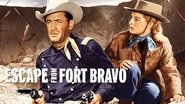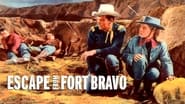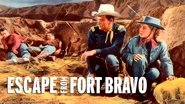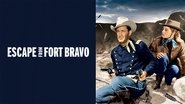jacobs-greenwood
Directed by John Sturges, this average Western set in 1863 combines elements of the Civil War with the struggle against the Mescalero Indians in settling the West. The Union Army maintains the titled stockade for some Southern Confederate prisoners in Arizona (actually filmed in Death Valley, California).Given the remote, desert location, the prisoners aren't likely to attempt escape without horses, or the guns needed to defend themselves against the Natives. So, it works pretty well. However, when one of the Southerners (John Lupton) does escape, Captain Roper (William Holden) feels it's necessary to make an example of him to keep others from trying the same - he makes him walk back! Captain Marsh (John Forsythe), as the leader of the Confederates, is not too happy about Roper's cruel and unusual punishment, but has a plan for he and a few others to escape. These others include the coward Bailey (Lupton), crotchety old Campbell (William Demarest), and young "buck" Cabot (William Campbell). Campbell and Cabot maintain a love-hate relationship.Colonel Owens (Carl Benton Reid) isn't too pleased with Roper's exhibition either, but he also realizes that Roper is the soldier who always gets his man too. Roper's subordinate, Lieutenant Beecher (Richard Anderson), who's about to marry the Colonel's daughter Alice (Polly Bergen), doesn't approve of Roper's methods either. Alice's cousin, Carla Forester (Eleanor Parker), comes to visit. En- route, Carla's stagecoach is attacked by some Mescaleros such that she's rescued by Roper's men on patrol. Alex Montoya and Western veteran Glenn Strange appear, uncredited, as Sergeants under Roper's command.Roper soon falls for the lovely, bold newcomer who we soon learn is betrothed to Marsh, and part of his escape plan. While Roper is distracted by his infatuation with Carla, she plots with the local storekeeper, and Southern sympathizer Watson (Howard McNear, uncredited) to affect their escape during the Beecher-Owen wedding reception. Later, it is clear that Carla has feelings for Roper such that she feels she too must escape with Marsh et al.Of course, Roper must pursue the escapees. Even though he knows, per the Colonel, that he was duped by Carla, he fears for her life because of the Mescalero Indians. Not exactly trusting his commander's intentions, the newlywed Beecher insists on going along as well. Naturally, Roper (and the few he takes with him) catches up with them, perhaps too easily, but on the way back to Fort Bravo, they are attacked by the Mescaleros.Under siege by superior numbers, Roper uses his military experience to find them the best possible place to mount their defense, a dugout. This "hole" works well, except for the fact that it is soon surrounded, leaving them, with limited water supplies and no horses, trapped. With virtually no other options, the soldiers, Union and Confederate, work together to stay alive. The film's most interesting action (battle) sequences, which include its climax, follow. Carla figures in the equation too.
RanchoTuVu
In 1863 Confederate soldiers are prisoner at Fort Bravo, a Union fort out in Arizona, where Mescalero Apaches are waging a war to defend their land. The fort is not well-garrisoned because there isn't much chance of an escape from Fort Bravo given the Mescaleros and the inhospitable desert setting. The movie has some good actors in William Holden and Eleanor Parker, but the story in which their characters operate does not do much for the western genre. However, there are excellent action scenes when the actual escape takes place with Mescalero arrows raining down from the sky. An improbable dance for the fort's officers and ladies seemed like they felt as if they had to do this to give the film some unnecessary and out of place social context in which to balance out the rugged western landscape. And the nagging and preposterous romantic subplot between Holden and Eleanor Parker waters down the action considerably. Plus everyone was exceptionally well-dressed for the setting they're in makes the whole affair look even more dubious. They may have acted well enough but they didn't have enough desert dust on them. Good thing for the well-executed Apache arrow attack or this film would have been totally borderline.
David_Brown
I had written a review of this film under a different variation of my name, but I watched it again, and learned a few things that I missed, so I am reposting and adding. What I missed was perceptive the character of Campbell (William Demerest who played Uncle Charlie from "My Three Sons") was. His remarks to fellow Confederate Soldier Cabot Young (William Campbell) were priceless. Like when Young asked him about old men fighting the war, and he said "Because you young men are losing it." Or when he said "Just go to sleep, I will wake you up when you are dead." Spoilers Ahead: He knew he would not survive, nor would Young (check out how they died together, at the hands of Indians). I do not think it was any accident about how linked the characters were (the name "Campbell" or the word and name "Young" were not there but accident). You could look at this as a father and son relationship or the Confederacy losing to the Union (or both). They were supposed to be comedic, but there were serious messages hidden in the comedy (messages I missed). As far as the main character, Capt. Roper is concerned, it certainly helped having William Holden in the lead. Holden excelled at Westerns ("The Wild Bunch", "Alvarez Kelly", "Streets of Laredo", "The Horse Soldiers" & "The Man From Colorado" to name a few), as he did in almost every film he was in. This film is no different. What makes it work is the complexity of the character Capt. Roper (an interesting name for a jailer (and again no. This is a man who is as tough as nails, and makes Javert (From Les Miserables), or Lt. Gerard (from "The Fugitive") seem like normal people, the way he hunts down Confederate Prisoners like animals (Like he did with Bailey (John Lupton)). Note: Even the name Roper is an interesting name for a jailer and how he captures escaped prisoners (and again not done by accident). Yet, underneath it all, there is a very different person. He does stuff like grow roses "Roper's Roses" that would be unexpected from such a hard a**. I love the relationship between him and Carla Forester (Eleanor Parker), who is very much like him (putting love and happiness last (but unlike Roper, does not know it)). She is a Confederate Spy who is engaged to Capt. Marsh (John Forsythe), and breaks him out of the stockade, and goes with him, not because she wants to, but because of duty and obligation. Marsh, who is the other major character in the film, is another very interesting character, he (like Campbell) seems to know that things will not work out the way he planned. Spoilers ahead. He knows that Carla really belongs to Roper, like when he had to snap at her to go with him when he and the other Confederate Soldiers escaped, and when after a fight and he was mortally wounded, he told Roper that Carla fell in love with him, and she only did her duty (Helping them escape). Finally he died with a smile on his face when Bailey (The only Confederate soldier to survive), ending up learning from Roper & Marsh how to be a hero, by escaping the Indians, and instead of running away, like he did earlier, he went back to the fort, and brought back the soldiers to save Roper, Carla, and Lt. Beecher (Richard Anderson), who was the only other survivor (interesting that Campbell somehow knew that would happen?). He also knew that Roper was the right person for Carla, because of his willingness to sacrifice himself for her and Beecher (When he went out to face the Indians alone, just before the Calvary showed up). Now in real life, it would be logical to assume that Carla would be Court Martialed and imprisoned for being a spy (they wound not hang a woman back in those days), and Bailey would be returned to the POW Camp to wait out the Civil War's end. But you get the feeling that since they were far from Washington, Col. Owens (a very wise, decent and humane Commander), would let Bailey go home (as a reward for saving Roper and especially Beecher (who married his Daughter, Alice)), and since no Union Soldiers died in the escape, he will probably let Carla go as well. Why? He never liked Roper's harsh tactics, and Roper might be even harsher to prisoners (or simply stops doing his job) if Carla is locked up, so why not simply let her go (provided Roper goes far away with her?). By freeing both Bailey and Carla (and taking Roper out of the equation), he can create a better POW Camp for everyone involved (certainly the Rebel POW's will appreciate that act, and Owens may need their help with the Indians down the line). Basically in the end, Roper goes from a "Roper" to being "Roped BY her" and like Bailey, is able to erase his personal demons, by physically and psychologically "Escaping From Fort Bravo." I really love this movie, and it deserves my highest praise 10/10
Wuchak
Released in 1953 and directed by John Sturges, "Escape from Fort Bravo" was always one of my top Westerns of the 1950s. It stars William Holden as Capt. Roper, who ruthlessly oversees a group of Confederate prisoners at a fort in the SW wilderness. John Forsythe plays Confederate prisoner Capt. Marsh and Eleanor Parker stars as Carla, a woman who visits the fort under the pretense of attending a wedding. As Roper falls for Carla, the Confederates take advantage of his love blinded-ness. When Roper goes after a group of escapees the soldiers have no recourse but to team up against a band of marauding Mescalero Indians.William Holden was in his prime here, as was the breathtaking Eleanor Parker, both stunning examples of masculine strength and feminine charm respectively.Although the soldiers rarely miss and the Natives rarely hit, the Indians are depicted in a realistic, respectable manner, showing ingenuity in their resolve to wipe out the pinned-down group of whites.William Campbell, well-known for the lead Klingon in the original Star Trek episode "The Trouble with Tribbles" and less-so as the alien Trelane in "The Squire of Gothos," has a formidable supporting role as one of the escaping Confederates. He was almost fifteen years younger and barely recognizable.While the events take place in 1865 the song played at the fort dance, "Mountains of Mourne," was written by Percy French 31 years later. Someone must've come back from the future. FINAL WORD: I realize a lot of pre-60's Westerns come off eye-rolling or artificial, but "Escape from Fort Bravo," doesn't fall into that category; that is, aside from the dated opening tune and the aforementioned song at the dance, as well as the parts that were obviously shot in the studio, which was typical in that era.The film runs 99 minutes and was shot in desolate regions of California (Semi Valley) and New Mexico (Gallup), including Death Valley National Park.GRADE: B+
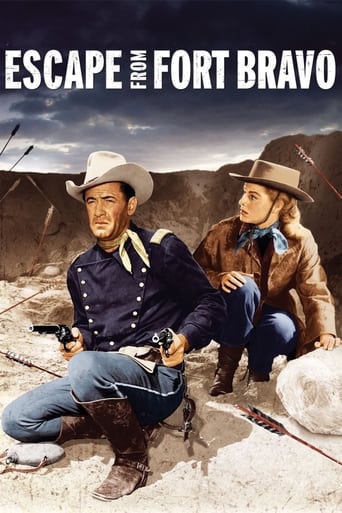
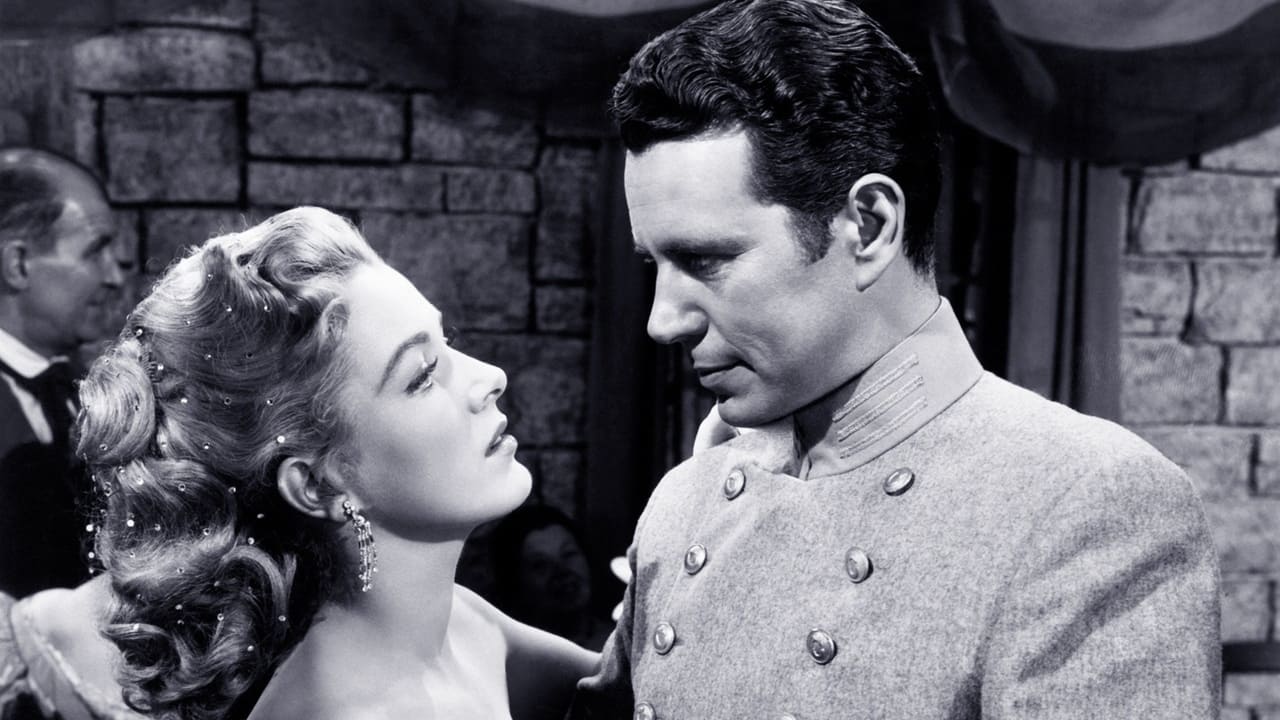

 AD
AD


